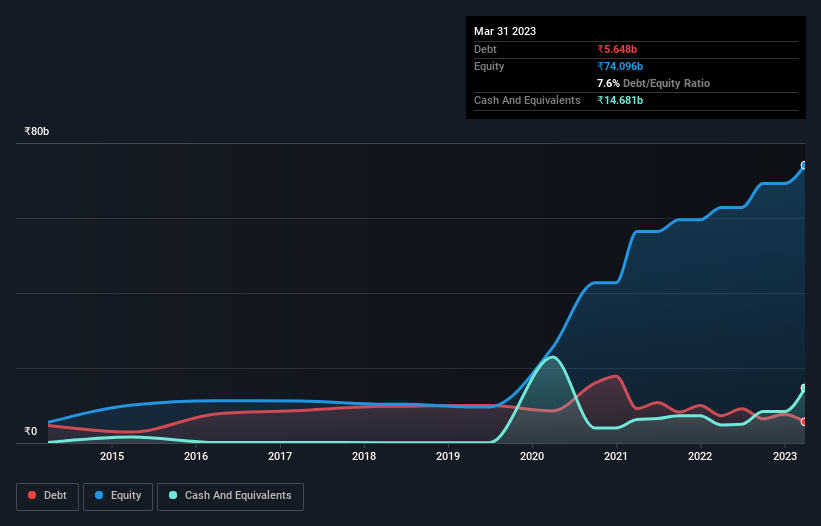- India
- /
- Healthcare Services
- /
- NSEI:MAXHEALTH
Max Healthcare Institute (NSE:MAXHEALTH) Could Easily Take On More Debt

The external fund manager backed by Berkshire Hathaway's Charlie Munger, Li Lu, makes no bones about it when he says 'The biggest investment risk is not the volatility of prices, but whether you will suffer a permanent loss of capital.' When we think about how risky a company is, we always like to look at its use of debt, since debt overload can lead to ruin. Importantly, Max Healthcare Institute Limited (NSE:MAXHEALTH) does carry debt. But is this debt a concern to shareholders?
Why Does Debt Bring Risk?
Debt is a tool to help businesses grow, but if a business is incapable of paying off its lenders, then it exists at their mercy. If things get really bad, the lenders can take control of the business. While that is not too common, we often do see indebted companies permanently diluting shareholders because lenders force them to raise capital at a distressed price. By replacing dilution, though, debt can be an extremely good tool for businesses that need capital to invest in growth at high rates of return. The first thing to do when considering how much debt a business uses is to look at its cash and debt together.
View our latest analysis for Max Healthcare Institute
How Much Debt Does Max Healthcare Institute Carry?
The image below, which you can click on for greater detail, shows that Max Healthcare Institute had debt of ₹5.65b at the end of March 2023, a reduction from ₹7.27b over a year. But it also has ₹14.7b in cash to offset that, meaning it has ₹9.03b net cash.

A Look At Max Healthcare Institute's Liabilities
According to the last reported balance sheet, Max Healthcare Institute had liabilities of ₹10.5b due within 12 months, and liabilities of ₹16.5b due beyond 12 months. Offsetting this, it had ₹14.7b in cash and ₹3.52b in receivables that were due within 12 months. So it has liabilities totalling ₹8.72b more than its cash and near-term receivables, combined.
This state of affairs indicates that Max Healthcare Institute's balance sheet looks quite solid, as its total liabilities are just about equal to its liquid assets. So while it's hard to imagine that the ₹577.6b company is struggling for cash, we still think it's worth monitoring its balance sheet. While it does have liabilities worth noting, Max Healthcare Institute also has more cash than debt, so we're pretty confident it can manage its debt safely.
In addition to that, we're happy to report that Max Healthcare Institute has boosted its EBIT by 34%, thus reducing the spectre of future debt repayments. The balance sheet is clearly the area to focus on when you are analysing debt. But it is future earnings, more than anything, that will determine Max Healthcare Institute's ability to maintain a healthy balance sheet going forward. So if you're focused on the future you can check out this free report showing analyst profit forecasts.
Finally, a company can only pay off debt with cold hard cash, not accounting profits. While Max Healthcare Institute has net cash on its balance sheet, it's still worth taking a look at its ability to convert earnings before interest and tax (EBIT) to free cash flow, to help us understand how quickly it is building (or eroding) that cash balance. Over the most recent three years, Max Healthcare Institute recorded free cash flow worth 53% of its EBIT, which is around normal, given free cash flow excludes interest and tax. This free cash flow puts the company in a good position to pay down debt, when appropriate.
Summing Up
We could understand if investors are concerned about Max Healthcare Institute's liabilities, but we can be reassured by the fact it has has net cash of ₹9.03b. And we liked the look of last year's 34% year-on-year EBIT growth. So we don't think Max Healthcare Institute's use of debt is risky. Another factor that would give us confidence in Max Healthcare Institute would be if insiders have been buying shares: if you're conscious of that signal too, you can find out instantly by clicking this link.
Of course, if you're the type of investor who prefers buying stocks without the burden of debt, then don't hesitate to discover our exclusive list of net cash growth stocks, today.
New: Manage All Your Stock Portfolios in One Place
We've created the ultimate portfolio companion for stock investors, and it's free.
• Connect an unlimited number of Portfolios and see your total in one currency
• Be alerted to new Warning Signs or Risks via email or mobile
• Track the Fair Value of your stocks
Have feedback on this article? Concerned about the content? Get in touch with us directly. Alternatively, email editorial-team (at) simplywallst.com.
This article by Simply Wall St is general in nature. We provide commentary based on historical data and analyst forecasts only using an unbiased methodology and our articles are not intended to be financial advice. It does not constitute a recommendation to buy or sell any stock, and does not take account of your objectives, or your financial situation. We aim to bring you long-term focused analysis driven by fundamental data. Note that our analysis may not factor in the latest price-sensitive company announcements or qualitative material. Simply Wall St has no position in any stocks mentioned.
About NSEI:MAXHEALTH
Max Healthcare Institute
Provides medical and healthcare services in India.
High growth potential with excellent balance sheet.


